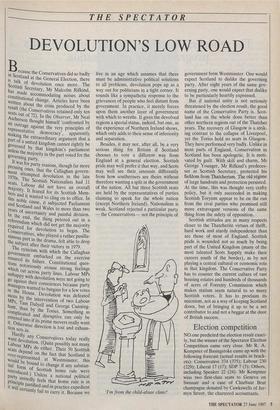THE SPECTATOR
DEVOLUTION'S LOW ROAD
ecause the Conservatives did so badly in Scotland at the General Election, there is talk of devolution once more. The Scottish Secretary, Mr Malcolm Rifkind, s made accommodating noises about constitutional change. Articles have been written about the crisis produced by the result (the Conservatives retained only ten seats out of 72). In the Observer, Mr Neal Ascherson thought himself 'confronted by an outrage against the very principles of representative democracy', apparently making the extraordinary argument that a part of a united kingdom cannot rightly be governed by that kingdom's parliament unless the majority in the part voted for the governing party. It was for party reasons, though far more pressing ones, that the Callaghan govern- ment attempted devolution in the late 1970s. The Scottish Nationalists had 11 seats. Labour did not have an overall majority. It feared for its Scottish. Mem- bers and it wanted to cling on to office. In this noble cause, it subjected Parliament and Scotland and Wales to more than two years of uncertainty and painful division. In the end, the thing petered out in a referendum which did not get the majority quired for devolution to begin. The Conservatives, who played a rather pusilla- nimous part in the drama, felt able to drop the subject after their victory in 1979. The cynicism with which the Callaghan government embarked on the exercise ensured its failure. Constitutionalques- tions notoriously arouse strong feelings which cut across party lines. Labour MPs "happy with devolution were not going to go against their consciences because party Managers wanted to bargain for a few votes in the House. Devolution was defeated more by the intervention of two Labour MPs, Tam Dalyell and George Cunning- ham, than by the Tories. Something as comp and disruptive can only be entered into if its prime movers really want it. Otherwise direction is lost and exhaus- tion sets in. Hardly any Conservatives today really Wan . ( t devolution. (Quite possibly not many Labour /VIPs do either. Their 50 Scottish seats depend on the fact that Scotland is over -represented at Westminster; this owould be bound to change if any substan- form of Scottish home rule were Part introduced.) Unless a national political Y unitedly feels that home rule is in Principle justified and in practice expedient will Certainly fail to carry it. Because we live in an age which assumes that there must be administrative political solutions to all problems, devolution pops up as a way out for politicians in a fight corner. It sounds like a sympathetic response to the grievances of people who feel distant from government. In practice, it merely forces upon them another layer of government with which to wrestle. It gives the devolved regions a special status, indeed, but one, as the experience of Northern Ireland shows, which only adds to their sense of inferiority and separation.
Besides, it may not, after all, be a very serious thing for Britain if Scotland chooses to vote a different way from England at a general election. Scottish pride may well prefer it that way, and Scots may well see their, interests differently from how southerners see theirs without therefore wanting a split in the government of the nation. All but three Scottish seats are held by the representatives of parties claiming to speak for the whole nation (except Northern Ireland). Nationalism is weak. Scotland rejected a particular party — the Conservatives — not the principle of
`I'm from the child-abuse clinic!
government form Westminster. One would expect Scotland to dislike the governing party. After eight years of the same gov- erning party, one would expect that dislike to be particularly heartily expressed.
But if national unity is not seriously threatened by the election result, the good name of the Conservative Party is. Scot- land has on the whole done better than other northern regions out of the Thatcher years. The recovery of Glasgow is a strik- ing contrast to the collapse of Liverpool, yet the Tories hold no seats in Glasgow. They have performed very badly. Unlike in most parts of England, Conservatism in Scotland has been apologetic. It is moti- vated by guilt. With skill and charm, Mr George Younger, Mr Rifkind's predeces- sor as Scottish Secretary, protected his fiefdom from Thatcherism. The old regime of large handouts and protection persisted. At the time, this was thought very crafty policy, but it only succeeded in making Scottish Toryism appear to be on the run from the rival parties who promised still more extravagant versions of the same thing from the safety of opposition.
Scottish attitudes are in many respects closer to the Thatcherite virtues of thrift, hard work and sturdy independence than are those of most of England. Scottish pride is wounded not so much by being part of the United Kingdom (many of the most talented Scots happily make their careers south of the border), as by not playing a central cultural or economic role in that kingdom. The Conservative Party has to counter the current culture of vast housing estates and hundreds of thousands of acres of Forestry Commission which makes statism seem natural to so many Scottish voters. It has to proclaim its unionism, not as a way of keeping Scotland down, but of bringing it up to be a net contributor to and not a beggar at the door of British success.









































































 Previous page
Previous page